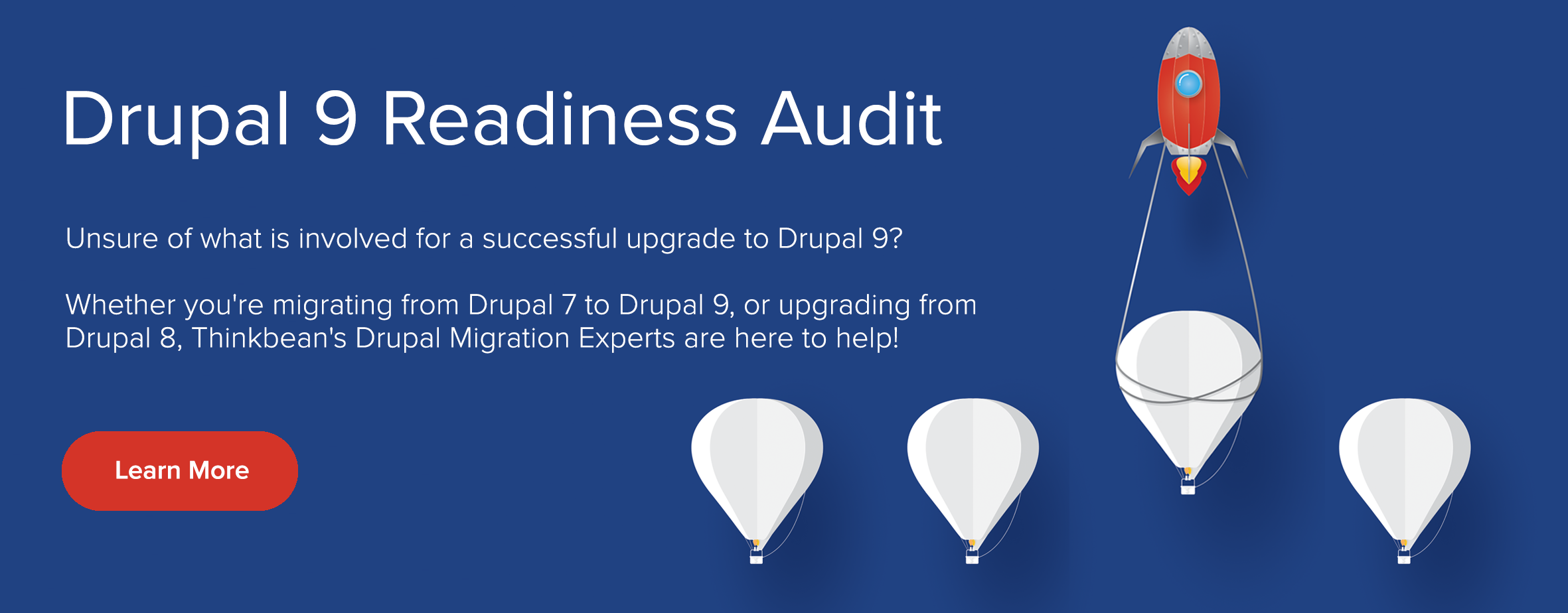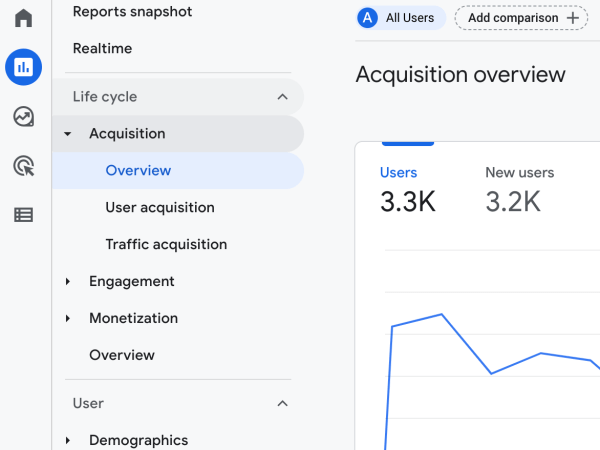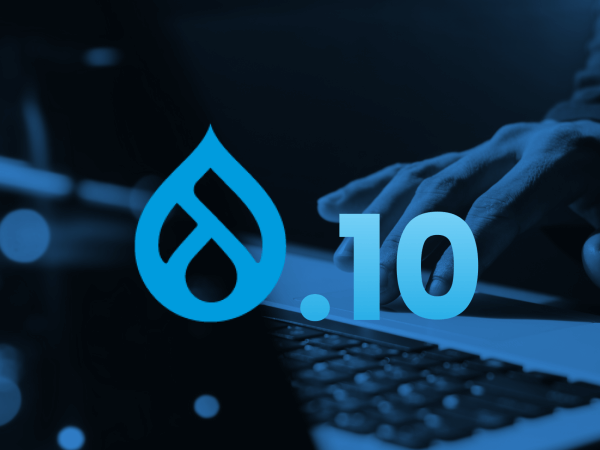Why You Should Undertake the Migration From Drupal 7 to Drupal 9
It may sound a bit like the title to a nature documentary - but it isn't. This is, in fact, the last great Drupal migration. This is the last time moving up to a higher version of Drupal is going to be a substantial undertaking - and you need to undertake it. From Drupal 8 and up, major version changes (moving from Drupal 8.x to Drupal 9.x to Drupal 10.x (yes, slated for release this coming June)) will be upgrades, not migrations. It may seem a semantic issue but it is, most assuredly, not as simple as that. Yes. Migrating from Drupal 7 to Drupal 9 may be a substantial undertaking for your organization (depending on many factors (e.g. database size, complexity of functionality, etc.)) and while we love Drupal and we are techies, we are still human. We realize most people aren't looking forward to going through this migration - but there are some very compelling reasons to be excited about the move!
Why Is This the Last Migration?
Perhaps, an easier way to think of the difference between Drupal 7 and Drupal 8 (and beyond) is like the difference between biological siblings and adopted siblings. Drupal 7 and Drupal 8 are like adopted siblings because they don't share the same "genetics". Under the hood, Drupal 7 looks very different and works very differently than Drupal 8. D8, D9 and above are like biological siblings. They do share the same "DNA". Under the hood, they look and operate very much the same (save for gained efficiencies in differing major versions after D8). Not to take this medical analogy too far but it may even help to think of a Drupal 7 migration as a medical transplant (of sorts). Drupal 7 is coming to the end of its life. In order to survive (and thrive), a Drupal 7 codebase needs to be "transplanted" into a new Drupal 9 "body".
As with any medical transplant, the parts being transplanted can't simply be taken out of one body and put into another without first going through very rigorous testing to ensure the recipient body won't reject the transplant. The same is true for a Drupal 7 migration. The codebase can't simply be transferred out of one version and into another. The codebase has to be rigorously combed-through for parts which Drupal 9 will reject. As you might imagine, that is a very time-consuming, meticulous process. If it isn't done properly, the migration will be rejected and the site will crash. It may help to think of the Thinkbean staff as transplant specialists. We know what to look for and where to look for it. We will make certain your migration proceeds properly, professionally and without complications.
Drupal 7 is the last version to operate the "old way". Drupal 8 was a radical paradigm shift in both how the platform worked on the "inside" (the codebase) and how the platform looked (and worked) on the "outside" (the administration and user experiences). The "new Drupal" was designed with one thing in-mind above all else - the future. It wasn't all beautiful, smooth sailing, either. Basically, D8 and above forced developers (and of course, development agencies) to re-think the way Drupal works - and the way we should be working with it. Think about that for a minute. For those of us in the USA who only speak English, imagine if someone walked into your office today and told you all your work from now on must be done in Mandarin. You'd have a choice to make. You could learn Mandarin and keep your job or you could go find another job. Now, that's not necessarily a great analogy but basically, developers had to either learn the new languages and the new ways of doing things or they'd have to find other platforms on which to work.
Many people fought the change. Many couldn't (or wouldn't) learn and adapt to the new coding protocols. However, there were also many who embraced the changes, understood the new direction and could see the grand plan. Those types jumped right on board the new Drupal Express train. No matter what one's personal feelings were, no one could deny the changes were for the better. It was clear the technologies on which D8 and above were based were superior to the previous versions of Drupal in every way. Something else was also very clear. From then on, only agencies working exclusively in Drupal were going to be able to thoroughly understand the differences in the "old" and "new" versions. Hence, only such agencies would be able to legitimately call themselves "Drupal experts". So, perhaps it is a bit more clear now why moving from Drupal 7 to Drupal 9 is very different than moving from Drupal 8 to Drupal 9.
What's the Big Deal With Drupal 9, Anyway?
Well, as the founder of Drupal phrased it, "The big deal about Drupal 9 is - it shouldn't be a big deal." It may sound a bit trite but (if you've been involved with Drupal for more than a few years (as we certainly have been) then you'll realize) that is a massive statement. Not only is Drupal much faster and much more efficient, flexible, scalable, adaptable, stable and secure than ever (great from both the client's and the agency's point of view) but the new UI/UX for admins and site visitors is light years ahead of Drupal 7 and its predecessors. Before D8, Drupal would experience some rather substantial growing pains every time a new, major version was released - if a new major version was released during a given year. There were just no set-in-stone methods (devs will get the pun, there) which were used to build the feature sets of Drupal core and any of the contributed (contrib) modules. Now, everything has become standardized. There are so many more efficiencies (both on the development side and on the user side) that migrating from Drupal 7 to Drupal 9 is really a no-brainer.
If you had an opportunity to buy a new phone right now for $3,000 but every year after that you were able to get a brand new phone with the latest features for only $30 - AND you'd never have to transfer your contacts, apps, message history, etc., etc. ever again, you'd probably do it. Well, Migrating from Drupal 7 to Drupal 9 may not provide that exact multiple (insofar as annual upgrade savings are concerned) but it's not terribly far off. The "new Drupal" is a bargain by almost any standard. It's almost impossible to overstate the benefits of D8 and above in comparison to Drupal 7 when it comes to... well... anything, really.
A Marketer's Dream
So, why would anyone look forward to going through this (potentially) big migration job which, frankly, sounds like an expensive headache? There are so many reasons, it's hard to state them all in one article. A short book, perhaps...
There's really no comparison. Let's face it, the "old Drupal" (D7 and below) were only user-friendly if an expert development agency had built out the back-end. If a less-than-stellar agency built out the back-end, the user experience (UX) could be truly intimidating. Doing something as simple as editing the price of a product might require navigating your way through a maze of arcane functionality. If an average dev agency was maintaining your application, changing the wording on one piece of content might require you to make changes in multiple places or you'd end up with different descriptions for the same item on different pages. Changing where on a page something showed up was strictly a no-go-zone for all but the most intrepid admins.
Now, don't get us wrong. You can still have a poorly-constructed "new Drupal" site if you get a less-than-talented agency to build one for you. We can all do more and more every year from our mobile devices. That doesn't mean we know how to write an app for a phone that allows us to do something new and amazing. Just as your phone gets better (faster, more memory, more processor cores, etc.) every year, allowing the app developers to write apps which can take advantage of the phone's new capabilities - which, in turn, allows us to do more as end-users of the phones; so, the "new Drupal" doesn't negate the need for an expert agency to build out the back-end (and front-end) of your Drupal 9 instance to allow you to easily take advantage of all those new time- and labour-saving features Drupal has to offer. If you get an expert agency to build out your new Drupal 9 site, you could have a level of control over the site that only a developer had in Drupal 7 and below. The Drupal core maintainers (and contrib creators/maintainers) have been working tirelessly over the last couple years to make everything easier for everyone.
Drupal 8 and above have become a marketing department's dream tools. If built and maintained properly, the level of control marketers can have over their sites greatly diminishes any reliance on development agencies to arrange/re-arrange/replace/etc. anything, anywhere on the site. To stay ahead of the competition, your marketing team needs the right digital tools at-hand. If you haven't already migrated to Drupal 8 then you're already falling behind. The amount of time your marketing team spends struggling with various tasks in Drupal 7 (tasks which have been made infinitely easier in D9) is causing your organization to consume unnecessarily large amounts of additional resources (time, effort, money). Approximately 75% of the D8 (and above) development process focused on making content creation and management easier for admins and end-users. That fact, alone, should give you an idea of how vastly improved the editing UI has become. To name just a few of the massive improvements for marketing departments:
- In-line Editing: (a.k.a. In-place editing) Edit content right where it is. So, you can see how your edits are going to look once published.
- Workflow Management: Define specific workflows for specific teams, Create permissions to control who can access which aspects of any given workflow.
- Digital Asset Management: A new media library saves content creators/editors substantial amounts of time searching for specific files by keeping everything in one, organized space.
- Layout Builder: Let's sum this up by stating this amazingly powerful module gives your content creators the ability to build out entire pages to make them look exactly the way they want - without having to write a single line of code!
- Massively improved multi-lingual capabilities and accessibility features have been added to help to reach wider audiences.
- "Everything Automation": Since D8, the platform has been built to allow for tight integration with marketing automation tools of all manner. The new integration capabilities allow marketing departments to provide hyper-personal digital experiences for their sites' users/visitors.
Those are just some of the great, new features built into the Drupal platform since D8 was released - and those are just for marketing departments. There are so many more little tweaks that, taken together, add up to a massively-improved platform for content creators, site admins and development agencies. What a Drupal 7 to Drupal 9 migration will cost an organization in terms of resources (time, effort, money) will pale in-comparison to what the organization will save (in a relatively short amount of time) with all the new time- and labour-saving features built into the new Drupal platform.
Still Open Source and Still Free!
One of the most amazing things about Drupal is the fact it always has been (and always will be) a free, open source platform. It's mind-blowing if you really think about it. Tens of thousands of people and hundreds of agencies have poured millions of hours of their own time into a platform which, in the right hands, can do anything. No other platform out there today even comes close to matching the capabilities of Drupal - while charging nothing for it. To really understand the significance of open source, try to imagine you have, let's say, a Sitecore instance and you need it to do something it doesn't currently do. Those hefty monthly fees you're paying for the "privilege" of using that platform only allow you to use the platform as-is. You can't make changes to it - or even hire someone to make the changes for you. You don't own that platform the way you "own" a Drupal instance. You can't change things at-whim. That great new idea you have that will set your site apart from the competition (or reduce your workload) will have to stay where it is - in your head. Of course, you could always ask if the company would be willing to make the changes you need - but they have to be willing and able to do it. Even if they are willing to implement your idea, as soon as it has been built and shipped then everyone using Sitecore now has the same capabilities as you. Your monthly fees would likely go up, too. With Drupal, all you have to do is build what you need (or tell your development agency to build it). Sure, you'll need to pay the agency to do it - but once it's built, that's that. You'll have it forever for a one-time fee - and you'll have a feature which sets you apart from all your competitors.
Drupal truly is a free platform. Anyone can download it at any time and if you have the skills, you can make it into whatever your organization needs. You only have to pay if you need an agency to make it do what you need it to do. If you get the right agency, you'll "need" them very little. Any agency worth its salt doesn't want hostages (clients who have to have to ask them to change the price of an item, change the title of an article, move an image to a different place on a page, etc.) An expert Drupal development agency wants to empower its clients to be able to do all those things (and so much more) without any agency assistance. If you find the right agency to properly perform this last great Drupal migration for your organization, you may well have found the last development agency you'll ever need.
Ready to Get Started?
Are you ready to start reaping the benefits of Drupal 9? Connect with our experienced Drupal strategists to ensure that your migration experience, whether you are coming from Drupal 7 or Drupal 8, is a smooth one.
- Log in to post comments




